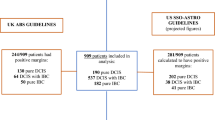Abstract
Purpose
The aim of the study was to compare recurrence-free survival (RFS) and overall survival (OS) of patients with early stage cervical cancer in dependence of surgical approach and treatment center.
Patients and methods
A population-based cohort study including women with early stage IA1-IIB2 cervical cancer treated by radical hysterectomy between January 2010 and December 2015 was performed.
Results
The median follow-up time was 5.6 years. After exclusions, 413 patients were eligible for analysis: 111 (26.9%) underwent minimal-invasive surgery (MIS) and 302 (73.1%) open surgery. Both treatment groups were well balanced regarding the clinical and pathological characteristics. The mean age of the patients was 51.0 years. MIS was associated with improved RFS and OS compared with the open surgery. The 5-year RFS rates were 89.2% in the MIS group and 73.4% in the open surgery group (p = 0.004). The 5-year OS rates were 93.7% in the MIS group and 81.8% in the open surgery group (p = 0.016). After adjustment for other prognostic covariates, the MIS was further associated with improved RFS (HR = 0.45, 95% CI 0.24–0.86; p = 0.015) but not with OS. Nevertheless, after adjustment for treatment center, the surgical approach was not associated with significant difference in RFS (HR = 0.61, 95% CI 0.31–1.19; p = 0.143). Overall survival of patients treated in university cancer centers was significantly increased compared to patients treated in non-university cancer centers. The treatment center remains a strong prognostic factor regarding RFS (HR = 0.49, 95% CI 0.28–0.83; p = 0.009) and OS (HR = 0.50, 95% CI 0.26–0.94; p = 0.031).
Conclusions
The treatment center but not the surgical approach was associated with the survival of patients treated with radical hysterectomy for early stage cervical cancer.



Similar content being viewed by others
References
Alfonzo E, Wallin E, Ekdahl L et al (2019) No survival difference between robotic and open radical hysterectomy for women with early stage cervical cancer: results from a nationwide population-based cohort study. Eur J Cancer 116:169–177
Bogani G, Cromi A, Uccella S et al (2014) Laparoscopic versus open abdominal management of cervical cancer: long-term results from a propensity-matched analysis. J Minim Invasive Gynecol 21:857–862
Bogani G, Leone Roberti Maggiore U, Rossetti D et al (2019) Advances in laparoscopic surgery for cervical cancer. Crit Rev Oncol Hematol 143:76–80
Casarin J, Buda A, Bogani G et al (2020) Predictors of recurrence following laparoscopic radical hysterectomy for early stage cervical cancer: a multi-institutional study. Gynecol Oncol 159(1):164–170
Colombo N, Carinelli S, Colombo A et al (2012) Cervical cancer: ESMO Clinical Practice Guidelines for diagnosis, treatment and follow-up. Ann Oncol 23(Suppl 7):vii27-32
Conrad LB, Ramirez PT, Burke W et al (2015) Role of minimally invasive surgery in gynecologic oncology: an updated survey of members of the society of gynecologic oncology. Int J Gynecol Cancer 25:1121–1127
Cusimano MC, Baxter NN, Gien LT et al (2019) Impact of surgical approach on oncologic outcomes in women undergoing radical hysterectomy for cervical cancer. Am J Obstet Gynecol 221:619
Diver E, Hinchcliff E, Gockley A et al (2017) Minimally Invasive Radical Hysterectomy for Cervical Cancer Is Associated With Reduced Morbidity and Similar Survival Outcomes Compared With Laparotomy. J Minim Invasive Gynecol 24:402–406
Eggemann H, Ignatov T, Geyken CH et al (2018) Management of elderly women with cervical cancer. J Cancer Res Clin Oncol 144:961–967
Falconer H, Palsdottir K, Stalberg K et al (2019) Robot-assisted approach to cervical cancer (RACC): an international multi-center, open-label randomized controlled trial. Int J Gynecol Cancer 29:1072–1076
Hillemanns P, Brucker S, Holthaus B et al (2019) Updated Opinion of the Uterus Commission of the Gynecological Oncology Working Group (AGO) and the Gynecological Endoscopy Working Group (AGE) of the German Society of Gynecology and Obstetrics (DGGG) on the randomized study comparing minimally invasive with abdominal radical hysterectomy for early stage cervical cancer (LACC). Geburtshilfe Frauenheilkd 79:145–147
Hwang JH, Yoo HJ, Joo J et al (2012) Learning curve analysis of laparoscopic radical hysterectomy and lymph node dissection in early cervical cancer. Eur J Obstet Gynecol Reprod Biol 163:219–223
Kim SI, Lee M, Lee S et al (2019) Impact of laparoscopic radical hysterectomy on survival outcome in patients with FIGO stage IB cervical cancer: a matching study of two institutional hospitals in Korea. Gynecol Oncol 155:75–82
Kimmig R, Ind T (2018) Minimally invasive surgery for cervical cancer: consequences for treatment after LACC Study. J Gynecol Oncol 29:e75
Lee B, Kim K, Park Y et al (2018) Impact of hospital care volume on clinical outcomes of laparoscopic radical hysterectomy for cervical cancer: a systematic review and meta-analysis. Medicine (Baltimore) 97:e13445
Melamed A, Margul DJ, Chen L et al (2018) Survival after Minimally Invasive Radical Hysterectomy for Early stage Cervical Cancer. N Engl J Med 379:1905–1914
Nam JH, Park JY, Kim DY et al (2012) Laparoscopic versus open radical hysterectomy in early stage cervical cancer: long-term survival outcomes in a matched cohort study. Ann Oncol 23:903–911
Nie JC, Yan AQ, Liu XS (2017) Robotic-assisted radical hysterectomy results in better surgical outcomes compared with the traditional laparoscopic radical hysterectomy for the treatment of cervical cancer. Int J Gynecol Cancer 27:1990–1999
Nitecki R, Ramirez PT, Frumovitz M et al. (2020) Survival After Minimally Invasive vs Open Radical Hysterectomy for Early stage Cervical Cancer: A Systematic Review and Meta-analysis. JAMA Oncol
Papathemelis T, Knobloch S, Gerken M et al (2019) Impact of nodal status and treatment strategy on overall survival in advanced stage cervical cancer. J Cancer Res Clin Oncol 145:1369–1376
Pergialiotis V, Rodolakis A, Christakis D et al (2013) Laparoscopically assisted vaginal radical hysterectomy: systematic review of the literature. J Minim Invasive Gynecol 20:745–753
Ramirez PT, Frumovitz M, Pareja R et al (2018) Minimally Invasive versus Abdominal Radical Hysterectomy for Cervical Cancer. N Engl J Med 379:1895–1904
Reade C, Hauspy J, Schmuck ML et al (2011) Characterizing the learning curve for laparoscopic radical hysterectomy: buddy operating as a technique for accelerating skill acquisition. Int J Gynecol Cancer 21:930–935
Shah CA, Beck T, Liao JB et al (2017) Surgical and oncologic outcomes after robotic radical hysterectomy as compared to open radical hysterectomy in the treatment of early cervical cancer. J Gynecol Oncol 28:e82
Uppal S, Gehrig PA, Peng K et al (2020) Recurrence Rates in Patients With Cervical Cancer Treated With Abdominal Versus Minimally Invasive Radical Hysterectomy: A Multi-Institutional Retrospective Review Study. J Clin Oncol 38:1030–1040
Wang W, Chu HJ, Shang CL et al (2016) Long-term oncological outcomes after laparoscopic versus abdominal radical hysterectomy in stage IA2 to IIA2 cervical cancer: a matched cohort study. Int J Gynecol Cancer 26:1264–1273
Funding
This study was not funded.
Author information
Authors and Affiliations
Contributions
PG: data collection, data analysis, manuscript writing/editing. MG: data collection, data analysis, manuscript writing/editing. JM: data collection, data analysis, manuscript writing/editing. MK-S: data analysis, manuscript writing/editing. OO: data analysis, manuscript writing/editing. HE: protocol/project development, data collection, data analysis, manuscript writing/editing. AI: protocol/project development, data collection, data analysis, manuscript writing/editing. All authors read and approved the final version of the manuscript.
Corresponding author
Ethics declarations
Conflict of interest
All authors declare that they have no conflict of interest.
Ethical approval
This article does not contain any studies with animals performed by any of the authors. All procedures performed in studies involving human participants were in accordance with the ethical standards of the institutional and/or national research committee and with the 1964 Helsinki declaration and its later amendments or comparable ethical standards.
Informed consent
Patients gave written informed consent for data transfer to the tumor registry before treatment. Additional individual consent for this analysis was not needed. According to the statement of the responsible Ethical Committees, an additional individual consent was not required for this analysis.
Additional information
Publisher's Note
Springer Nature remains neutral with regard to jurisdictional claims in published maps and institutional affiliations.
Rights and permissions
About this article
Cite this article
Gennari, P., Gerken, M., Mészáros, J. et al. Minimal-invasive or open approach for surgery of early cervical cancer: the treatment center matters. Arch Gynecol Obstet 304, 503–510 (2021). https://doi.org/10.1007/s00404-020-05947-y
Received:
Accepted:
Published:
Issue Date:
DOI: https://doi.org/10.1007/s00404-020-05947-y




